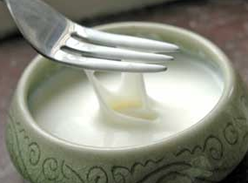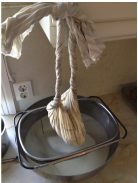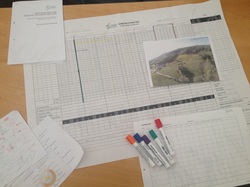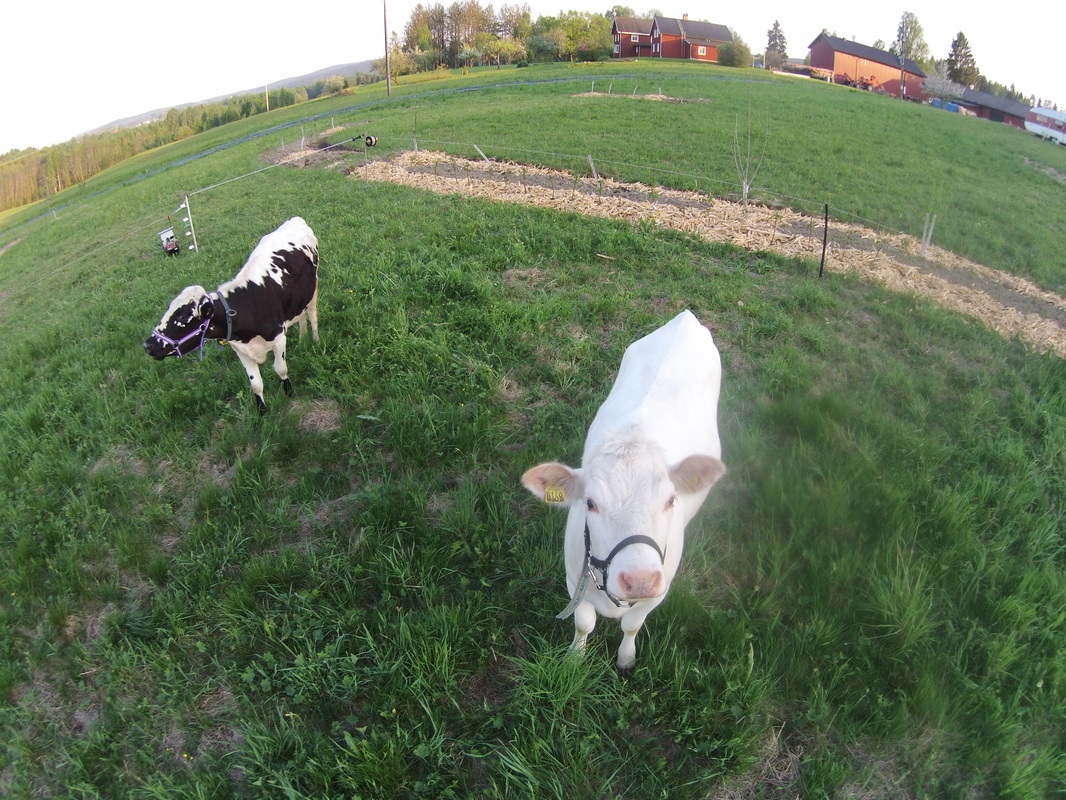 We will spend the weekend meeting locals and hosting an open day. One of our objectives is to better understand what people locally grew up eating, what they miss, what they wish they could buy regarding local & ecological food. Långfil (also known as long milk) is a kind of sour milk requiring low souring temperature and long maturation. It has a mild acidity, and texture is chewy almost bubbly like a whipped desert. The bacterial culture consists primarily of Lactococcus lactis ssp cremoris who put together the milk carbohydrates for long exopolysaccharides, which leads to the texture.
1 Comment
 Rennet is a complex of enzymes produced in any mammalian stomach, and is often used in the production of cheese. Rennet contains many enzymes, including aproteolytic enzyme (protease) that coagulates the milk, causing it to separate into solids (curds) and liquid (whey). They are also very important in the stomach of young mammals as they digest their mothers' milk. The active enzyme in rennet is called chymosin or rennin but there are also other important enzymes in it, e.g., pepsin and lipase. There are non-animal sources for rennet that are suitable for consumption by vegetarians. Here we are making simple fresh cheeses with Acid Coagulation as we easily consume all we get from Clover May. Next year we will have 3 or 4 cows at the farm.  It's Day 2 of our certified Holistic Management training, dipping into the 2nd half of our awesome 10 Week Internship program. The Savory Institute has been updating, clarifying and simplifying their workbooks as smaller & more concise workbooks, available cheaply via their website. We have been running through Financial Planning and Grazing Planning today, using the farm as a model for planning for the factors, observations and circumstances we have in our situation, to ensure we create the best possible plan to move consistently towards our Holistic Context. We see managing holistically is key to forwarding effective regenerative enterprises and regenerating degraded landscapes whilst creating resilient & socially just incomes into the future. We plan to write some series of articles to clarify some of the common misconceptions and explain the process to support others to start managing holistically. Stay tuned for details.
We have another 10 Week Internship running at the farm July- Sept, with a few spots open, where once again we will be training up a diverse and engaging group in the following areas; The 10 Week internship includes over 530hrs of curriculum based learning & 5 Certificate Courses;
Elin, the Ridgedale Chef, has been lovingly restoring this old cream separator. We met a lovely old lady who used to be a champion milker at Ag school and had equipment lying around she was willing to sell us. Compared to modern equipment this gear is super robust, reliable and well engineered (at a fraction of the cost) We like well engineered stuff, and from the context of only needing dairy for farm needs, there seems no better way to go.  Our lovely Fjällko cows, Viola & Clover are doing great after their arrival to Ridgedale. They have adapted effortlessly to life in rotational grazing and seem to enjoy all the attention they get along with hand milking twice a day. With over 30 people representing all the major climate zones here at the farm there is demand for fresh milk and yoghurt, and Clover (who is in the early stages of her 2nd pregnancy and still giving great milk) is supplying it. Towards the end of the year we will have 3 cows and possibly Viola will be pregnant too, which should supply us with all our dairy needs. These cattle are well suited to our needs; a small cow that is hardy, comes from a mountain habitat and likes to browse on a wide variety of fodder and produces milk, that whilst not being so plentiful, comparing the yield per kg live body weight, it is on par with the larger breeds SRB and Swedish Holstein. In addition, mountain cow milk is very well suited to cheese production as it contains high levels of "good" protein. Compared with milk from other breeds it is (per kg milk) almost twice as large, which means it only goes to 7-8 kg mountain cow's milk to get 1 kg of cheese, compared with 14-16 kg of milk from commercial breeds. |
Details
Like us on FB Below for regular updatesStay up to date with customized updates you want to receive
Upcoming coursesArchives
December 2016
Categories
All
|


 RSS Feed
RSS Feed